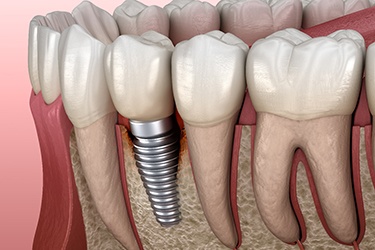Dental Implant Failure & Salvage – Schenectady, NY
Renewing Your Restored Smile

Dental implants are a consistently successful treatment. For most patients, they provide decades of confident smiles and reliable function. However, in rare cases, circumstances arise that lead to a failed dental implant in Schenectady. If you ever believe there is a problem with one of your implants, contact our team right away. We will evaluate the situation and recommend your next steps. Our goal is to get your oral health back on track as conservatively and efficiently as possible.
Why Do Dental Implants Fail?

The most common cause of dental implant failure is a type of infection known as peri-implantitis. It occurs when harmful bacteria invade the tissue around the implant. Eventually, the damage can become so bad that the bone and gums can no longer support the implant. Poor oral hygiene is often to blame for peri-implantitis.
Other possible causes of dental implant failure include:
- Failed osseointegration (the implant never bonds properly with the surrounding bone)
- Certain illnesses, such as some types of cancer
- Physical trauma, such as that caused by an accident or chronic teeth grinding
Symptoms of Failed Dental Implants

Dental implants in Schenectady can fail at any time, whether it is soon after the initial placement surgery or years later. Therefore, it is important that you stay on the lookout for this issue. Here are some symptoms that merit a call to our dental office:
- Some discomfort after the placement surgery is normal, but severe or prolonged pain is a red flag.
- A loose-feeling implant. In some cases, this occurs because the restoration on top of an implant is damaged. In other cases, the implant itself is in jeopardy.
- Difficulty chewing. After your implants are restored, you should be able to eat most foods with ease. Difficulties in this area indicate a need for professional care.
- Signs of infection. Pus, swelling, bleeding, persistent bad breath, and redness in the gum tissue are all potential signs of peri-implantitis.
How Dental Implant Salvage Works

Call us right away if you believe there is a problem with one of your dental implants. The sooner you seek care, the more likely it is that we will be able to address the situation with conservative means.
When you arrive for your appointment, we will visually examine your mouth and perhaps take some X-Rays or a CBCT scan. From there, we will recommend a treatment. In some cases, we can save an implant with antibiotics or other simple measures. In other instances, we must remove a failing implant altogether. Later, after a healing period and possibly a bone graft, you might be eligible for a new implant.
